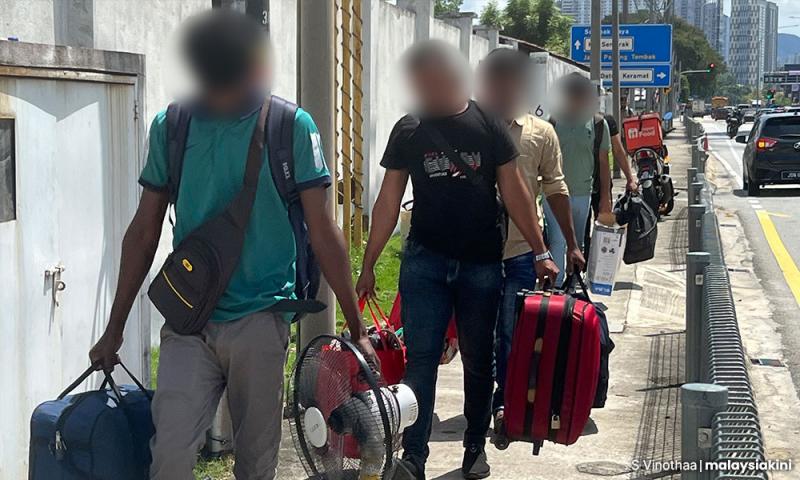LETTER | Migrant dilemma: Between inclusion and alienation
LETTER | Over the last few decades, Malaysia has welcomed migrants, whether documented or undocumented, into different economic sectors to fill in the gaps in low-skilled and semi-skilled labour shortages.
A critical aspect of the hostility shown towards migrants is a reflection of Malaysians' insecurities, such as employment insecurity or losing privileges as citizens as a social threat, which have led them to view migrants as alien entities who are stealing jobs from locals, completely disregarding the grim and harsh realities of the migrants' lived experiences.
Online platforms such as X, Facebook and Instagram have become a breeding ground for hate speech where anti-immigrant propaganda has become a grave threat to national harmony.
The narrative that Malaysia is a multicultural society that thrives in diversity and respect for people from various cultural backgrounds has led to a distorted view of reality, where the complexity and challenges of migrants are often swept under the rug.
What factors have contributed to the complex and often challenging perceptions of migrants among Malaysians? Has this perspective been a consistent part of our national psyche?
Social Media: A double-edged sword
With its immense power and reach, social media has transformed how people express their opinions, particularly by providing the ability to remain anonymous.
This facet of social media facilitates a sense of detachment from personal accountability, as anonymity often emboldens users, making it easier and more comfortable for them to express their malignant views without accountability.
For instance, the creation of fake profiles, where people can use stolen pictures of others, as a way to prevent digital traces, has become a new culture of spreading propaganda.
Simultaneously, it is important also to note that now, many users openly use their real names and photos while aggressively advancing anti-immigrant propaganda.
Advocates of free speech have accelerated a trend that represents a departure from the veil of anonymity that often characterises digital interactions, suggesting a deeper confidence in their stances and a willingness to be associated with their views publicly.
This has become a model for others, encouraging people to stand firm in their prejudiced beliefs, without considering the weight and impact of their opinions.
One of the most glaring examples of the dehumanization of migrants displayed on social media is when the media highlights immigration raids or crimes committed by migrants.
The portrayal of migrants as “cancer” to society, with the support of unethical journalism, has contributed to a public perception heavily skewed towards viewing migrants as societal liabilities, rather than individuals with complex stories and struggles despite their honourable contributions to building this nation.
In a recent immigration raid, the Internet became a gallery of despair, filled with photographs that showed migrants seated helplessly on the ground, their faces exposed and etched with a mix of fear and anxiety. As each image made its rounds across various social media platforms, there was a notable surge of support for the government's actions, with many applauding their rigorous enforcement.
However, unbeknownst to these supporters, their endorsements subtly echoed the sentiments of Ruth Wilson Gilmore: "Capitalism requires inequality and racism enshrines it."
As Malaysia grapples with the complexities of migration, it is crucial to remember that behind every headline and social media post are human stories deserving of dignity and understanding.
Breaking away from dehumanising portrayals
The dehumanisation of other human beings who were not fortunate enough to be born on a silver platter harms Malaysian society which continuously prides itself on the values of unity and diversity. When born with privilege, it is easy for individuals to demand others to be perfect human beings if they want to be treated humanely or with respect.
It is a lot easier to deny people of their humanity and cast migrants as villains, thereby denying them the multifaceted human experience that they rightfully own. By repeatedly associating migrants with criminality and societal disruption, social media perpetuates a dehumanised image of migrants, fostering a climate of mistrust and hostility.
This negative spotlight strips migrants of their identities, reducing them to mere subjects of fear and suspicion. It overlooks the diversity among migrant communities, their reasons for migration, and the often harsh realities they face.
To break away from these dehumanising portrayals of others, an approach that should be given consideration is the establishment of a policy that outlines the elements of criminal hate speech. Although numerous laws exist to deter actions or statements that incite hostility, significant shortcomings within these laws are evident.
Key among these is the absence of a clear definition of what constitutes hate speech, as well as a lack of established thresholds for determining when hate speech crosses into the realm of criminal hate speech.
It is worth exploring the feasibility of establishing a legal framework for hate speech that is in line with international human rights standards and ensuring that independent bodies undertake any form of media regulation.
This step can be a step of moving towards a direction where the media can work on promoting journalism that enhances people’s understanding of migrant issues in Malaysia.
The views expressed here are those of the author/contributor and do not necessarily represent the views of Malaysiakini.
RM12.50 / month
- Unlimited access to award-winning journalism
- Comment and share your opinions on all our articles
- Gift interesting stories to your friends
- Tax deductable
